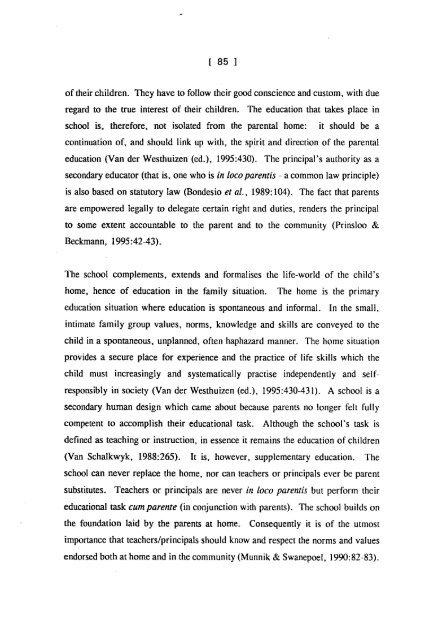parents and principals as partners in creating a culture of learning
parents and principals as partners in creating a culture of learning
parents and principals as partners in creating a culture of learning
You also want an ePaper? Increase the reach of your titles
YUMPU automatically turns print PDFs into web optimized ePapers that Google loves.
[ 85 1<br />
<strong>of</strong>their children. They have to follow their good conscience <strong>and</strong> custom, with due<br />
regard to the true <strong>in</strong>terest <strong>of</strong> their children. The education that takes place <strong>in</strong><br />
school is, therefore, not isolated from the parental home: it should be a<br />
cont<strong>in</strong>uation <strong>of</strong>, <strong>and</strong> should l<strong>in</strong>k up with, the spirit <strong>and</strong> direction <strong>of</strong> the parental<br />
education (Van der Westhuizen (ed.), 1995:430). The pr<strong>in</strong>cipal's authority <strong>as</strong> a<br />
secondary educator (that is, one who is <strong>in</strong> loco parentis - a common law pr<strong>in</strong>ciple)<br />
is also b<strong>as</strong>ed on statutory law (Bondesio et al., 1989: 104). The fact that <strong>parents</strong><br />
are empowered legally to delegate certa<strong>in</strong> right <strong>and</strong> duties, renders the pr<strong>in</strong>cipal<br />
to some extent accountable to the parent <strong>and</strong> to the community (Pr<strong>in</strong>sloo &<br />
Beckmann, 1995:42-43).<br />
The school complements, extends <strong>and</strong> formalises the life-world <strong>of</strong> the child's<br />
home, hence <strong>of</strong> education <strong>in</strong> the family situation. The home is the primary<br />
education situation where education is spontaneous <strong>and</strong> <strong>in</strong>formal. In the small,<br />
<strong>in</strong>timate family group values, norms, knowledge <strong>and</strong> skills are conveyed to the<br />
child <strong>in</strong> a spontaneous, unplanned, <strong>of</strong>ten haphazard manner. The home situation<br />
provides a secure place for experience <strong>and</strong> the practice <strong>of</strong> life skills which the<br />
child must <strong>in</strong>cre<strong>as</strong><strong>in</strong>gly <strong>and</strong> systematically practise <strong>in</strong>dependently <strong>and</strong> self<br />
responsibly <strong>in</strong> society (Van der Westhuizen (ed.), 1995:430-431). A school is a<br />
secondary human design which came about because <strong>parents</strong> no longer felt fully<br />
competent to accomplish their educational t<strong>as</strong>k. Although the school's t<strong>as</strong>k is<br />
def<strong>in</strong>ed <strong>as</strong> teach<strong>in</strong>gor <strong>in</strong>struction, <strong>in</strong> essence it rema<strong>in</strong>s the education <strong>of</strong> children<br />
(Van Schalkwyk, 1988:265). It is, however, supplementary education. The<br />
school can never replace the home, nor can teachers or <strong>pr<strong>in</strong>cipals</strong> ever be parent<br />
substitutes. Teachers or <strong>pr<strong>in</strong>cipals</strong> are never <strong>in</strong> loco parentis but perform their<br />
educational t<strong>as</strong>k cum parente (<strong>in</strong> conjunction with <strong>parents</strong>). The school builds on<br />
the foundation laid by the <strong>parents</strong> at home. Consequently it is <strong>of</strong> the utmost<br />
importance that teachers/<strong>pr<strong>in</strong>cipals</strong> should know <strong>and</strong> respect the norms <strong>and</strong> values<br />
endorsed both at home <strong>and</strong> <strong>in</strong> the community (Munnik & Swanepoel, 1990:82-83).

















